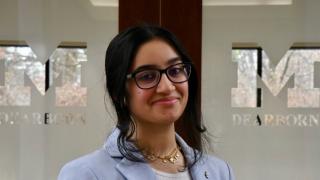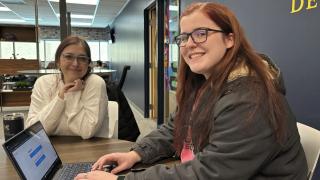Experts from around the world — from the past and today — will teach students need-to-know lessons from the Holocaust.
Through a $20,000 Ravitz Foundation grant, History Lecturer and Voice/Vision Holocaust Survivor Oral History Archive director Jamie Wraight is creating a full-feature online experience for the History 387: Aspects of the Holocaust course by using archived expert lectures, Holocaust survivor testimony from UM-Dearborn’s archive collection, internationally renowned speakers on the World War II genocide, and more. The class, currently offered once a year, will now be offered, twice thanks to the grant.
Wraight,says the class attracts students from across disciplines — art, engineering, business and health. He says part of the attraction is related to curiosity about the Holocaust. But there is also the understanding that this goes beyond learning about a past event — and awareness is important because people across culture and industry can be affected.
“This is bigger than a history class. I emphatically make the point that this is cross discipline,” says Wraight, who notes that the course is a popular choice among students and often has a waiting list. “Without the tech know-how of engineers, there wouldn’t have been gas chambers. Economic forces contributed to propaganda against the Jews and later they became economically exploited in concentration camps through slave labor. Genocide is an obvious public health concern. And there was the criminal justice angle about the involvement of the German police and legal profession, as well as what happens to the perpetrators after the war. All areas of society were impacted by this atrocity.”
To honor International Holocaust Remembrance Day on Wednesday, Wraight said Natalia Aleksiun, associate professor of Modern Jewish History, the Touro College Graduate School of Jewish Studies, will present, “Intimate Violence: Jewish Testimonies about the Holocaust in Eastern Europe.”The lecture will be recorded and made available to those unable to attend.
Wraight says he took over directing the Voice/Vision archive from Professor Emeritus Sidney Bolkosky, who was among the first researchers to interview Holocaust survivors in an effort to document their experiences. Through Bolkosky’s work, the Voice/Vision archive has more than 300 first-hand accounts of life during World War II’s systematic, bureaucratic, state-sponsored persecution and murder of six million Jewish men, women and children.
Bolkosky, who taught on campus from 1972-2012, was also a campus pioneer in remote learning — sending videos of his lectures to students in UM-Dearborn’s REACH program, a distance-learning initiative that started in the late 1980s. Bolkosky died in 2013.
“I have several DVDs of Sid’s lectures from what Sid recorded for the REACH program. He was masterful in talking about survivor testimony — he interviewed many of them before (Steven) Spielberg did — and the survivors who talked to him after remarked that they told Sid more. If our students can hear from one of the best in the field — someone who was right here on our campus — they should hear about it from him. Not only will this benefit the people taking this class, it also honors Sid’s memory.”
Wraight says Ravitz family members, who oversee the foundation, were familiar with Bolkosky’s work. And because of the reputation the UM-Dearborn archive has, they came to campus in 2019 to explore ways they could help expand Holocaust education. Several options were explored, but COVID-19 moving communal activities online helped Wraight see the value of an expanded virtual course any interested person could take from anywhere. He also says it’s a living course, which means it will be updated regularly.
“We have a highly notable archive — we have shared what we have on campus with Yale and the Holocaust Museum in Washington. D.C. — so why not make our resources available to anyone, no matter where they are? We can connect students to survivor testimonies, recognized experts from across the world and actress time,” Wraight says.
He says developing the new course is a collaborative effort. In addition to the Ravitz Foundation, the UM-Dearborn staff in the HUB for Teaching and Learning, College of Arts, Sciences, & Letters Media Studio and the Mardigian Library, as well as several UM-Dearborn faculty colleagues are bringing the project to life.
“Even during a pandemic, no one — when I asked for their time — flinched. They want to get this project ready for our students,” says Wraight, who remarked that the project is underway and will be complete by May. “My colleagues see the importance of a learning opportunity like this. The more we learn, the more we are aware of the behaviors and environment that led to this taking place.”
He says the Holocaust may be history — but cautions what is old can be made new again. He says lessons from the Holocaust education aren’t uplifting; but they are important.
“Pay attention to the world or around you. Not all people were actively persecuting the Jews. But they didn’t stop it either — they stayed in their own bubble and later regretted it,” Wraight says. “Having a healthy dose of skepticism about the information you receive is a good thing. The more we know, the more we can rely on our knowledge to stand up to injustices we may see.”




